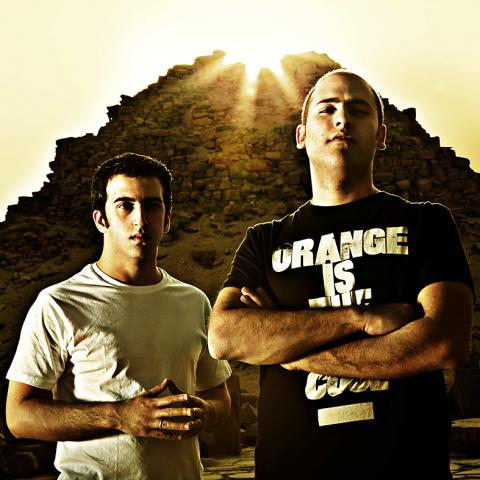Egypt’s electronic dance music scene is emerging from behind a shadow cast by political turmoil and social unrest. While small, it does exist and Egyptian DJ trance music duo Aly & Fila are showing the world that it hasn’t been all hardships in their country this year by offering a rare glimpse into its club scene. The duo play tomorrow night alongside Ferry Corsten at the sixth annual 2F White Party presented by theLOOP.
Saturday’s line up is, as usual, stacked with DJs that dominate DJ Mag’s renowned Top 100 DJ list, but Aly (real name Aly Fathallab) and Fila (real name Fadi Wassef Nahuib), who have made the list five times, are a special treat. The duo managed to do what no other DJ troupe in Egypt has done before—they made it big.
“It is very rare,” they said together in an email interview with the Taipei Times. “We were the first duo from Egypt who went international. For sure it was not easy, Egypt is quite far from most European cities, but we stuck at it and joined a booking agency and it snowballed from there.”

Photo courtesy of theLoop
And the world responded well to the pair’s unique take on trance, helping them establish a new subgenre of the form. Fans have described their music as euphoric and emotional and their style has been coined “Egyptian trance” because it is heavily laced with elements of Egyptian culture.
“It is something new for an Egyptian trance duo,” they continued. “It’s quite mystical with the whole ancient Egyptian side of things, and we are very well supported by DJs such as Armin van Buuren in their play lists and radio shows, and that helps massively.”
The pair credits Paul van Dyk as their big push into the scene. “We used to collect [his] mixes in the mid- to late 1990s and it really inspired us to make electronic music. And because of the energy in his music and sets, you can see our sets are full of energy also.”

Photo courtesy of theLoop
Both Aly and Fila, who met in kindergarten in Egypt, still reside in Cairo where they are working on expanding a rapidly growing scene. “Electronic dance music is growing nicely in Egypt. House music is (already) quite big but we are trying to change that with our events and weekly radio show on Nile FM called Future Sound of Egypt,” they said.
But though Aly & Fila and their trance counterparts dominate top DJ lists, some people think the genre is on its way out as electro DJs takeover festival lineups and top charts worldwide. Ferry Corsten, a Dutch trance DJ that needs little introduction, says he’s not opposed to the jump.
“Electro is an interesting genre,” said Corsten, who has just returned from deejaying in Iceland near the North Pole. “I use many elements of it within my tracks. While I will always stay true to trance, I’ll try and put new elements in it and experiment a little to see what the result may be.”
Corsten originally did not plan to focus on trance, but was encouraged by his success in the genre. “I wasn’t really interested into trance when I started. I was just interested in music in all forms. The first tracks I produced were quite underground. I produced a whole range of genres: electro, house and even hardcore. I reached a good amount of success with my trance productions, which lead me to take it further.”
And further it went. Corsten has since released seven studio albums and has an awards list that is longer than the number of years that electro has been around.
Corsten believes that trance achieves things that will keep it in the stronghold of the electronic dance music scene for years to come. “I think trance music has a very strong connection with human emotions. The melodies can perfectly represent an indescribable feeling. As a DJ, I can really lose myself in the music. And as a listener, you can really lose yourself as well.”
“And trance makes people come together and love one another,” he added.
theLOOP presents the sixth annual 2F White party featuring Aly & Fila, Ferry Corsten, AN21, Max Vangeli, Orjan Nielsen, Reaz:on and Cookie tomorrow night at the New Taipei Exhibition Hall (新北市工商展覽中心), 1 Wucyuan Road, Wugu Industry Park, New Taipei City (新北市五股工業區五權路一號).
Tickets are still available today for NT$1,400 at any 7-11 iBon machine or directly from Luxy. Admission is NT$1,600 at the door for those wearing white, but a steep NT$2,300 for those who aren’t.

In the March 9 edition of the Taipei Times a piece by Ninon Godefroy ran with the headine “The quiet, gentle rhythm of Taiwan.” It started with the line “Taiwan is a small, humble place. There is no Eiffel Tower, no pyramids — no singular attraction that draws the world’s attention.” I laughed out loud at that. This was out of no disrespect for the author or the piece, which made some interesting analogies and good points about how both Din Tai Fung’s and Taiwan Semiconductor Manufacturing Co’s (TSMC, 台積電) meticulous attention to detail and quality are not quite up to

It is one of the more remarkable facts of Taiwan history that it was never occupied or claimed by any of the numerous kingdoms of southern China — Han or otherwise — that lay just across the water from it. None of their brilliant ministers ever discovered that Taiwan was a “core interest” of the state whose annexation was “inevitable.” As Paul Kua notes in an excellent monograph laying out how the Portuguese gave Taiwan the name “Formosa,” the first Europeans to express an interest in occupying Taiwan were the Spanish. Tonio Andrade in his seminal work, How Taiwan Became Chinese,

April 21 to April 27 Hsieh Er’s (謝娥) political fortunes were rising fast after she got out of jail and joined the Chinese Nationalist Party (KMT) in December 1945. Not only did she hold key positions in various committees, she was elected the only woman on the Taipei City Council and headed to Nanjing in 1946 as the sole Taiwanese female representative to the National Constituent Assembly. With the support of first lady Soong May-ling (宋美齡), she started the Taipei Women’s Association and Taiwan Provincial Women’s Association, where she

Mongolian influencer Anudari Daarya looks effortlessly glamorous and carefree in her social media posts — but the classically trained pianist’s road to acceptance as a transgender artist has been anything but easy. She is one of a growing number of Mongolian LGBTQ youth challenging stereotypes and fighting for acceptance through media representation in the socially conservative country. LGBTQ Mongolians often hide their identities from their employers and colleagues for fear of discrimination, with a survey by the non-profit LGBT Centre Mongolia showing that only 20 percent of people felt comfortable coming out at work. Daarya, 25, said she has faced discrimination since she